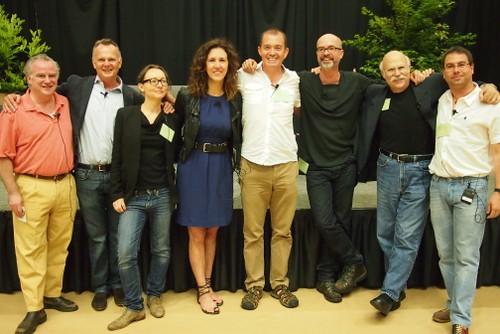
I love this picture. It’s a group photo of our panel at the IPNC Grand Seminar, which we did twice, on Friday and Saturday mornings. We were discussing how we perceive wine, and then communicate this perception in words. Because I was moderating I didn’t take any notes, but I thought I’d share my impressions.
It was done chat-show style. I had a seat, and the seven guests joined me one by one on the two couches. So we had seven conversations, with each bringing their own unique perspective on this topic. They were all super, because we got to do this twice, we developed quite a bond by the end. And day 2 was a step up from day 1, as you might expect.
First up was Steven Shapin, who is a professor of the history of science at Harvard. The real deal. He has looked at how the way people describe wines has changed over time. The way we now speak about wine is a recent development,and it’s interesting to see how different the language of wine used to be. You can read a paper of his on this topic here. He’s a really cool guy.
Next, the fabulous Elaine Brown explained her unique approach to wine communication. One of the things she does is draw tasting notes of wine, and it was really good to hear about an approach to communication perception that avoids words. We experience a wine as a perception and then it’s easy for the words to get in the way of communicating this experience to others. This is her website.
Josh Raynolds was the third guest. He’s the assistant editor for International Wine Cellar, and rates 7000 wines a year for the publication. How does he describe wine? He has to be quite analytical, and can’t get away with flowery descriptions. Josh also described how much the wine world has changed since he started working in this field in the mid-1980s.
Then Frank Stitt, who is a chef and restaurateur from Birmingham Alabama. He owns four restaurants and is unusual for a chef in that he’s a wine person, and oversees the wine program. Frank talked about the importance of sourcing wines and getting to know the producers in the same way that he has relationships with his food suppliers. It’s a very integrated approach where the wine and food are brought together.
Pascaline Lepeltier is a recent MS who is wine director at Rouge Tomate in New York, a busy Michelin-starred restaurant. She has put together a 1200 strong wine list with a strong emphasis on organic, biodynamic and natural wines. She described how she has very little time to read the customer, understand what they want, and then make suggestions. The most important part of her job, she says, is to listen. It was really interesting hearing the sort of language for describing wine that a top sommelier uses with their guests, and also the sorts of terms that she finds her guests using to describe what they are looking for.
Back to academia for our next guest,the brilliant Jordi Ballester from the University of Burgundy in Gijon. He studies the cognitive aspects of wine tasting, and has recently published on the way we use the term minerality (everyone seems to mean something different by it, so we should be more specific). Jordi described a brilliant game he plays with his students. They face each other with several glasses of wine each. They have the same wines, but in a different order and numbered differently. The aim of the game is to match the wines from their descriptions of them. We discussed the way that we describe wine in words, which is a really interesting subject.
Finally, something very different. Hall Newbegin is a wilderness perfumer from California, and his company is called Juniper Ridge. He goes out into nature and selects botanicals that he the uses to produce natural scents with a sense of place, using traditional extraction techniques. Hall talked about our sense of smell and how we need to develop it – to learn to smell properly. And he’s just getting into wine, which with his advanced understanding of smelling is a very interesting journey.
Later, I’ll report on how taking part in this seminar has crystallized my thinking on the language of wine, and how I am going to try to change the way I talk about wine in response.
1 Comment on The IPNC Grand Seminar, windows of perception


Very refreshing, indeed, to see a colleague speak so highly of other colleagues within the same field. The wine industry could use more of this kind of generosity of spirit. Really enjoyed reading this piece and am now eagerly awaiting more. Also, I have Jamie Goode to blame for having been led down the rabbit hole of the internet, where I spent a lot of time on the wonderful Juniper Ridge website. Was time well spent on the internet, for a change